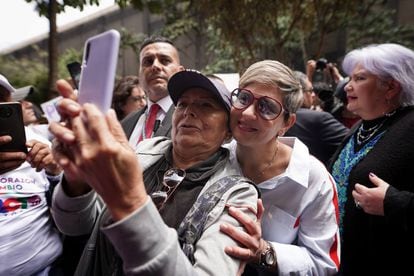Verónica Alcocer usually appears next to her husband, Gustavo Petro, in the foreground, every time the first left-wing leader of contemporary Colombia appears on the balcony of the Casa de Nariño. It is the postcard of the presidential couple. Her visibility contrasts with that of other first ladies who preceded her. Surrounded by controversies, she has been anything but discreet. Her unusual activity and political influence inflames tempers around a figure many consider obsolete.
In a hyper-presidential country, the partner of the current president does not have clearly defined functions, his role corresponds to customs and practices. In formal terms, she is not a public official, she does not have a budget nor can she be summoned for political control, although she usually manages Ministries, so his expenses are a focus of controversy. Verónica Alcocer, as revealed this week by an investigation by The Empty Chair, the leading political portal, “has used his power to have an entourage that has cost the State more than a billion pesos” (about $250,000) in the year and a half that Petro has been in power. The entourage that usually accompanies her on her trips includes her best friend, a photographer, a personal makeup and wardrobe artist, and a personal advisor, hired by three different public entities with salaries that exceed those of a minister.
The revelations clash with the narrative of a Government that constantly appeals to the popular and pursues – at least discursively – a certain degree of austerity. President Petro's family has been his weak flank, and his third wife is no exception. The most recent controversy has once again stirred up the debate about the need for the figure of the first lady in Colombia.
Criticism has intensified, and not only from the right-wing opposition. “No one told us that 'change' in Colombia would come with our own version of Marie Antoinette: abuse, waste, undue political influence and blatant favoring of friends,” said Rep. Catherine Juvinao of the progressive Green Alliance party. “Titles in democracy are an obsolete legacy when they are linked to the person and not to the function, much less to the responsibility,” representative David Racero, of the ruling Historical Pact, reaffirmed for his part, when they claimed that in the In the past he had questioned the first lady, which he considers an “anti-republican legacy.” “If there is going to be a debate about that figure, let's do it seriously, regardless of who the person or the current president is,” he clarified on his social networks.
There is a legal vacuum about what the responsibilities of the first lady are, says analyst Eugénie Richard, a professor who is an expert in communication and marketing politician from the Externado University of Colombia. Therefore, it is difficult to hold him accountable. “This debate about whether the figure of the first lady should disappear is complicated, because she herself is a ghost character, who does not have a very specific legal status. It all depends on tradition, the president in turn and the personality of the first lady. “Some are interested in being very discreet and others are interested in being protagonists,” he assesses. “Although she is not constitutionally necessary, she always unleashes love and hate, she is easy prey for the opposition,” he adds. He approves of her taking care of domestic issues, childhood issues or malnutrition, but if she raises her profile she begins to attract criticism. A framework that perpetuates gender stereotypes.
Newsletter
The analysis of current events and the best stories from Colombia, every week in your mailbox
RECEIVE THE

The discussion has increased in volume with Alcocer, which had a marked role since the campaign itself, with mass baths in the public square and a visit to Pope Francis. The noise around him has been constant. At times he has held more political power than Vice President Francia Márquez, who does have a popular mandate, and has been a diplomatic representative of the Government on several occasions. She even led the Colombian delegation at the funeral of Queen Elizabeth II of England.
The Colombian press attributes numerous appointments in the public administration to Alcocer – something both difficult to prove and debatable. Her neighbor, Concepción Baracaldo, who was for a semester the director of the Colombian Institute of Family Welfare (ICFB), declared on her day that it seemed normal to her that she was the one who had offered her the position. They also attribute to him a close relationship with the Vice Minister of Culture, Jorge Zorro, who remained as minister in charge for an entire semester. Zorro has denied to this newspaper that the first lady has any influence in the Ministry of Culture.
For analyst Mónica Pachón, this influence on appointments is exceptional in the Colombian context. “That the friends of the president's wife are protagonists of public policy is very strange, that is the anomaly,” says this professor from the University of Los Andes. “She plays an important political role, according to the investigations carried out by different media, without having a background political,” he adds.

In what has perhaps been his most controversial appearance, Alcocer appeared at night and by surprise last March at the Congress facilities, a few meters from the Casa de Nariño, while a meeting was underway with several ministers and congressmen who were seeking unclog the legislative process of the health reform, the most resisted among the Government's great social reforms. Petro was traveling to the United States. The unfortunate visit spread like wildfire on social networks and from many different sides it was interpreted as undue interference.
There are examples of powerful first ladies. In Argentina, Cristina Fernández de Kirchner was first lady before becoming president and in the United States Hillary Clinton was also first lady before becoming a presidential candidate. But in the region there are other mirrors that cast a sharper reflection. In Mexico, the wife of President Andrés Manuel López Obrador, the writer and historian Beatriz Gutiérrez Müller, has always rejected the title of “first lady” and declined the traditional position of head of the National System for the Comprehensive Development of Families. However, she has been a diplomatic representative of the Government on more than one occasion. She was, among others, in charge of attending the inauguration of Gabriel Boric as president of Chile.
Chile is precisely a particular case. Boric and his partner, the anthropologist and feminist Irina Karamanos, had proposed in their campaign to abolish the figure. Months after coming to power, and after a shower of criticism for the delay, they began a process to transfer to related ministries the traditional functions of the first lady, which in the southern country meant automatically assuming the direction of six foundations, apart of protocol tasks. At the end of 2022, the first lady's office in La Moneda was permanently closed. Last November, Boric confirmed the end of his relationship with Karamaros. In Chile there was a precedent, since in the first Government of Michelle Bachelet, between 2006 and 2010, these functions had already been delegated to people who were paid for their work. She was the first woman to become President, a milestone that Colombia has not yet reached.
Subscribe here to the EL PAÍS newsletter about Colombia and here to the channel on WhatsAppand receive all the information keys on current events in the country.
#Colombia #lady #millionaire #expenses #Verónica #Alcocer #Gustavo #Petro39s #wife #stir #debate